
The Grounds Guys offer expert tips for winter lawn preparation:
|
Last Updated November 27, 2023
You may think that maintaining and caring for your lawn only happens in the spring and summer months, but proper lawn care is important all year long. As the colder weather takes hold, it’s time to begin preparing your lawn for winter.
What does it mean to winterize a lawn? Should you fertilize your lawn in the winter? What about watering and preventing winter lawn damage? In preparation for the chilly season, the lawn care experts at The Grounds Guys® have put together some winter lawn care tips to help your lawn thrive even during the coldest months of the year.
Table of Contents:
The Basics of Pre-Winter Lawn Care
Preparing your lawn for winter begins in the fall. In many parts of the United States, winter is a rough season that can stress and damage your lawn. By preparing your lawn in the autumn months, you can help your grass stay strong during the cold weather and revive more quickly in the spring. This is known as pre-winterizing your lawn.
The best time to pre-winterize your lawn will depend on your location. Late September is generally a good month to start, but you may need to take these steps a little sooner if you live in the northern part of the country. You may also be able to wait until early October if you live in a warmer climate.
Here are the steps to follow to pre-winterize your lawn.
Increase Your Mower Height
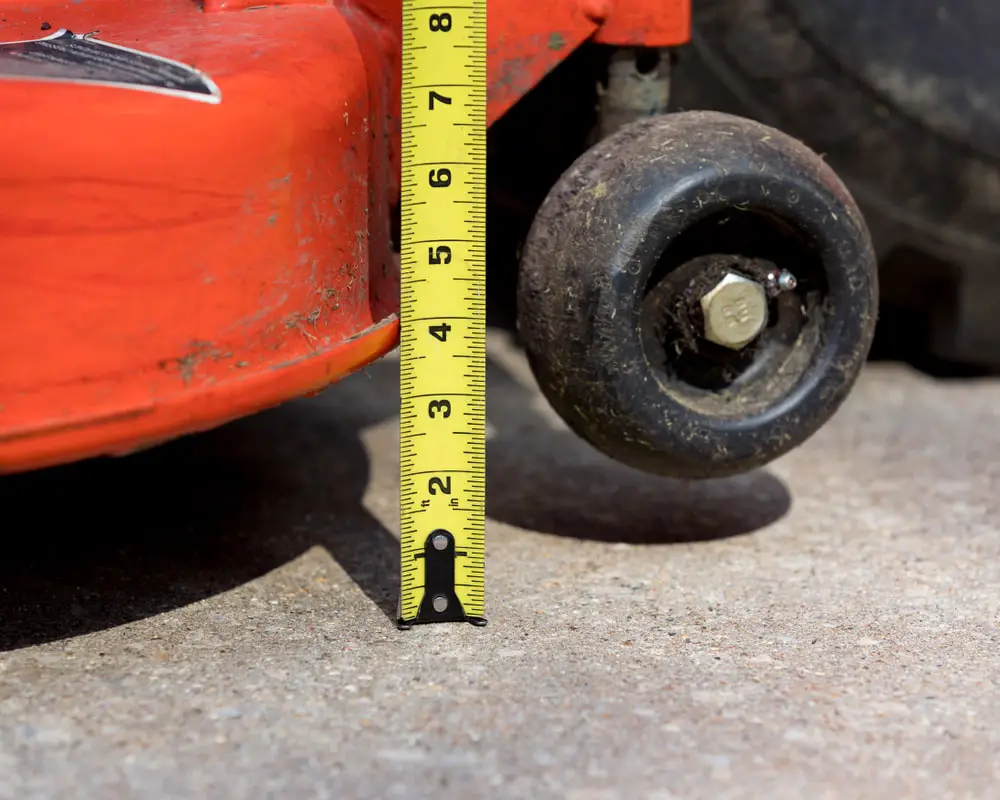
As the days become shorter in the fall and winter, your grass will receive less sunlight. Raise your mower height half an inch or a full inch to allow your grass to be longer. More leaf area helps your grass absorb more sunlight, which means it can store more fuel for the coming winter. As a bonus, thicker grass also helps prevent the growth of weeds and it’s more resistant to disease.
Perform Weed Control
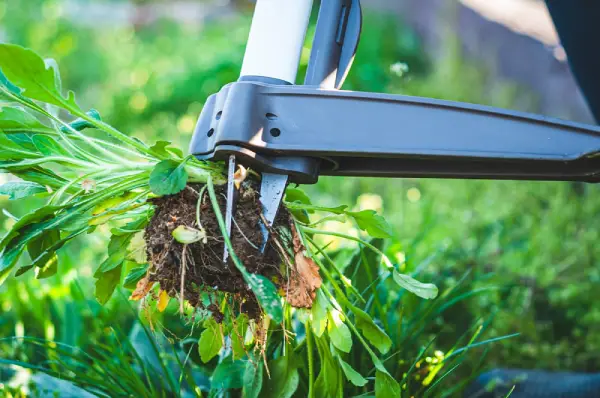
Weeds often compete with your grass for nutrients and sunlight. If you have cool-season grass, apply an herbicide in the fall to battle cool-season weeds like dandelion, clover, and chickweed. Not only will you give your lawn a better shot of staying strong through the winter, but you can also prevent weeds from popping up in the spring.
Rake or Mow Your Leaves
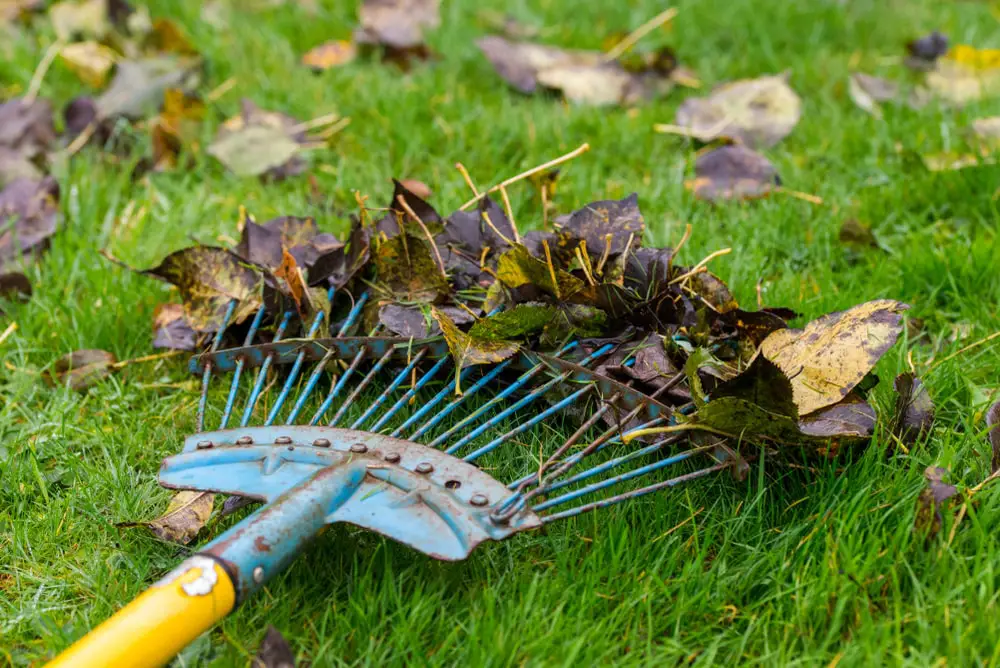
When the colorful leaves start falling to the ground, get out your rake. A thick blanket of leaves over your lawn will block sunlight, oxygen, and other nutrients from reaching your grass. Wet leaves can also promote the growth of mold and fungus.
Try to rake your leaves regularly or mow them if you have a mulching mower. Just make sure your leaves are dry before mowing.
Aerate Your Lawn
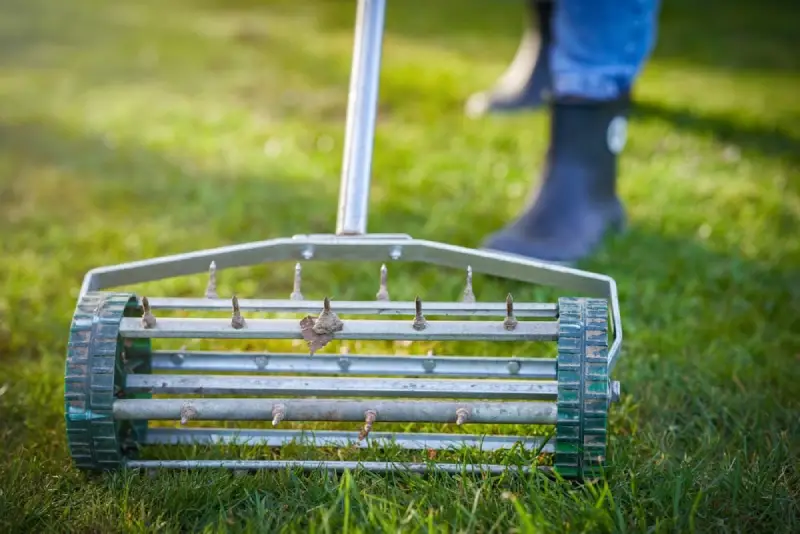
Aerating is a key part of preparing your lawn for winter. It makes it easier for your lawn to absorb fertilizer, water, and oxygen, so your other winter lawn care efforts will be more successful. Choose a day when your soil is moist but not soggy. Use a core aerator if you have one to get the best results. You can also use an aerator attachment on your mower. Make sure to do a few passes on your yard to get full coverage.
Fertilize Your Lawn
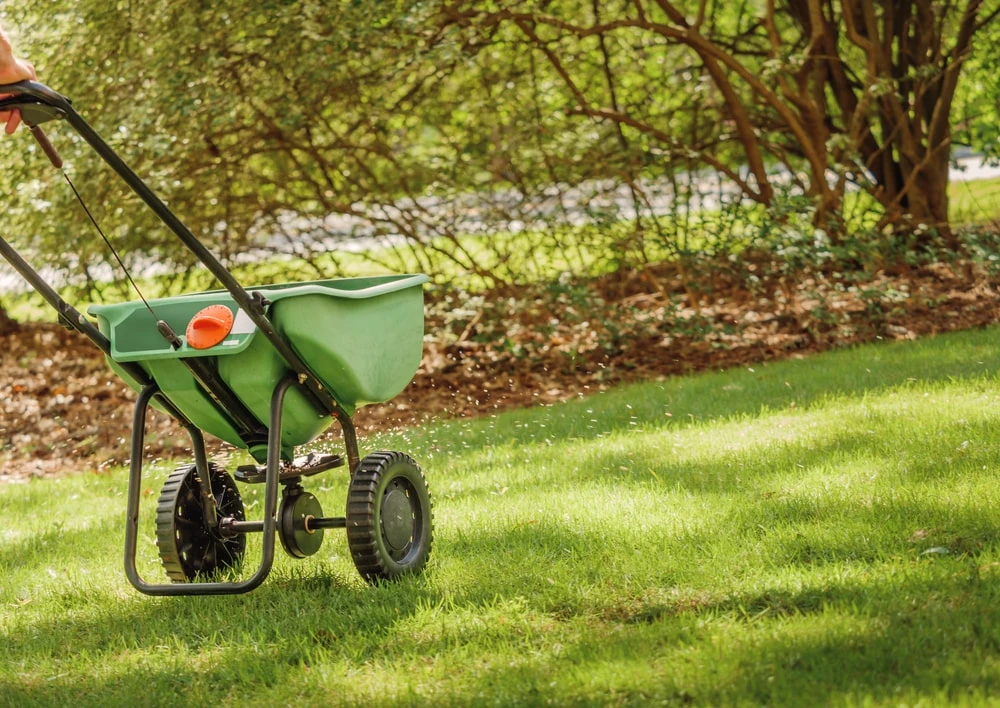
Want to know how to keep grass green in winter? That’s not always possible in certain parts of the country, but fertilizing in late fall (usually October or November) can give your grass a needed boost of nutrients. Fertilizing your lawn will help strengthen grass roots. This may help your lawn stay greener in warmer parts of the country and survive the snow and ice in colder areas.
Add Compost
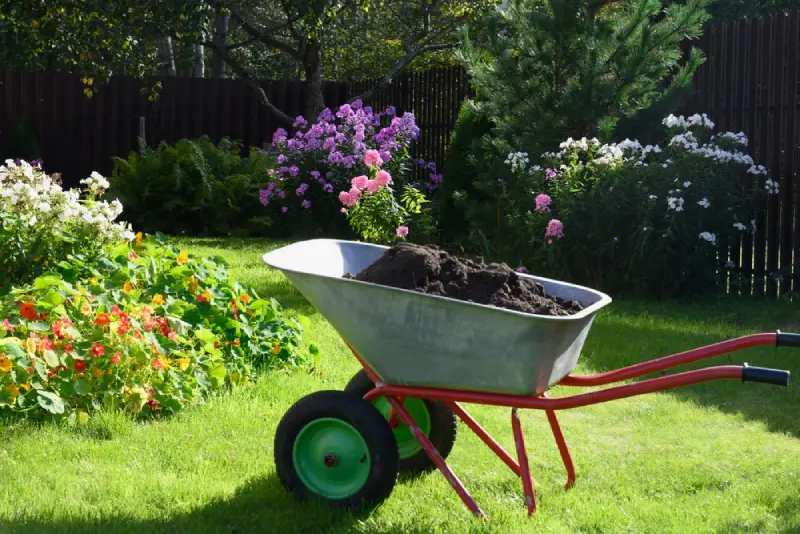
If your lawn looks a little bare or sports some bald patches, add cured compost to the areas that need the most help. Compost is filled with nutrients and will give your grass seeds the energy boost they need to germinate before the cold weather hits.
Overseed
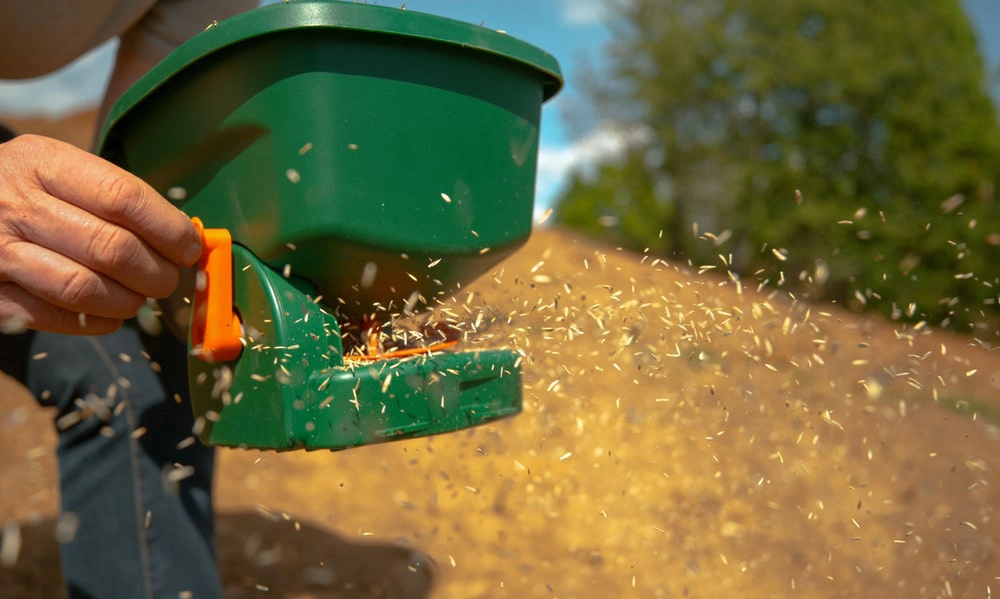
If you don’t get much ice and snow during the winter, you may consider overseeding your lawn. Overseeding helps grass stay lush during the winter months when your normal cool-season grass goes into its winter dormancy. Overseeding can also be used to fill areas where grass is especially sparse or if you have bald patches on your lawn.
When seeding, make sure to use overlapping seed passes so your lawn looks even.
Rake and Water Your Seeds
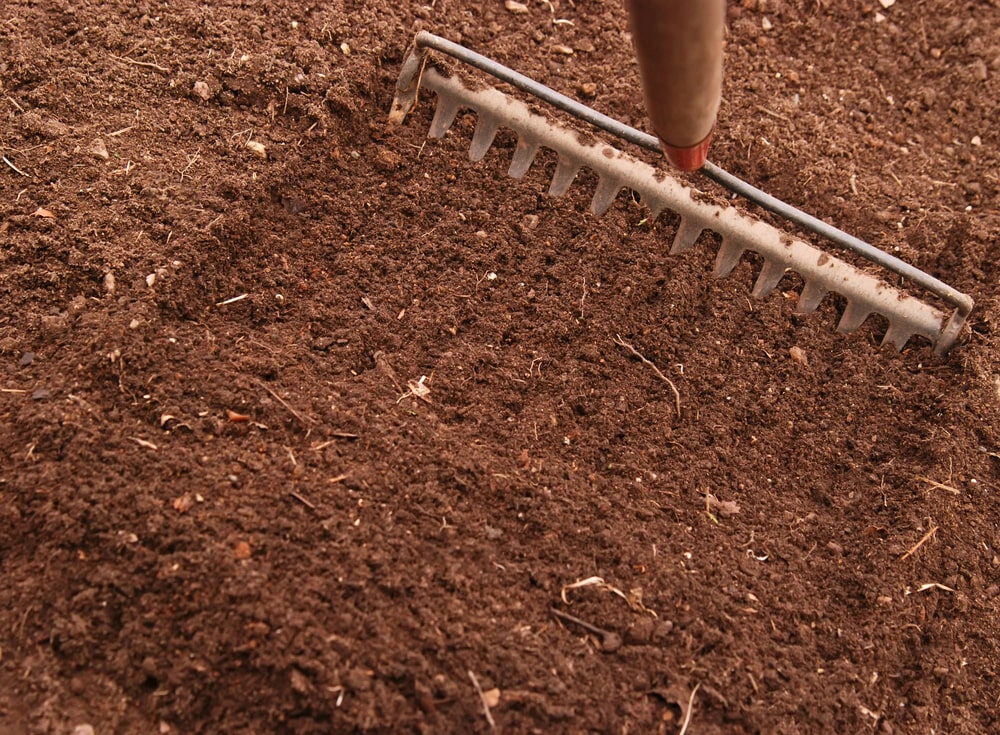
To give your grass seeds the best chance to grow, rake them into your compost and soil and then water them regularly. You might want to water lightly up to three times a day until you see the new grass shoots begin to emerge. At that time, you can lower your water frequency to once a day.
Winter Lawn Care Prep
Now that you’ve completed your pre-winter lawn care, what do you need to do as the cold weather approaches? In this section, we’ll show you how to fully winterize your lawn so that your grass will be in the best shape to greet spring.
People who live north of the Mason-Dixon line will need to winterize their water system by early to mid-November. However, if the weather is still relatively mild where you live and you have yet to winterize your sprinklers (or don’t need to), you can water your lawn once a week (depending on the amount of rain). Once the weather starts to turn colder, winterizing your sprinkler system is crucial not only for your system but your wallet, too! Failure to winterize could result in damage to your watering system since any water left in the system can freeze and break the pipes. If you need to winterize your sprinklers, take some time to survey your system and fix any items that need repair.
When you’re ready to winterize, use the irrigation shutoff valve to shut down the system. Flush the pipes with air to remove any water. Test the backflow and open the drain screws so that you can blow it out completely. Then, insulate the above-ground plumbing and shut down the control panel. This means no more watering using your system, so your lawn will have to rely on natural precipitation. The colder weather will slow the growth of your lawn, which means it doesn’t need as much water to survive.
Winterize Your Lawn Mower
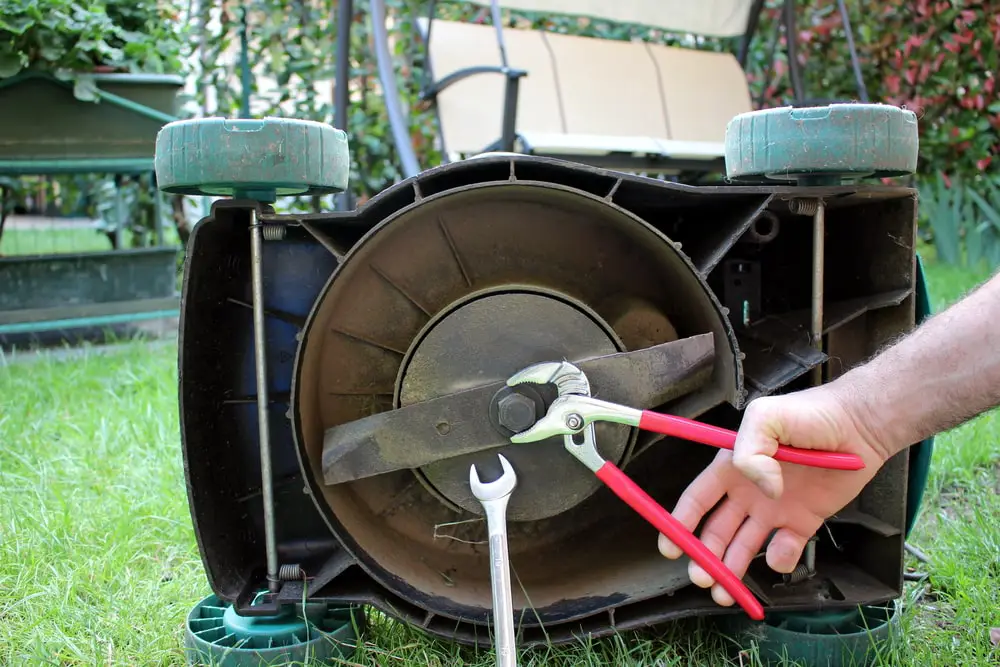
Part of winter lawn maintenance is tending to the tools you use to care for your lawn throughout the year. Since lawn growth slows considerably during the colder months, you won’t have to mow your lawn much, if at all. Therefore, you should winterize your lawn mower. You can do this by emptying the fuel, replacing the spark plug and air filter, changing the oil, and removing the battery. Clean the lawn mower deck and lubricate any moving parts. This will help ensure the longevity of your mower. When warmer weather and your lawn return, your mower will be ready to handle the job.
Minimize Traffic
Part of winter lawn care and a good way to minimize winter lawn damage is by limiting the amount of foot, animal, and vehicle traffic your lawn is subject to this winter. Heavy and consistent traffic could wear a path in your lawn and damage it for the coming season. Since the soil underneath your lawn is compacted and relatively dry during the winter, traffic can cause damage that can be a challenge to repair. You can minimize traffic by clearing a walking path nearby to encourage a set traffic pattern (you can also use a small garden fence).
Avoid Getting Salt on Your Lawn
Salt is not a healthy addition to your lawn, especially during the winter when it is most vulnerable. During these cold months, salt can damage or even kill your lawn. To prevent salt damage, consider placing burlap or a plastic covering around the edges of your lawn. This can help protect it from any salt that you may inadvertently spread when clearing your driveway or walking paths. Minimize using salt in areas close to your lawn, and be careful when you apply it. Some homeowners forgo using salt altogether, opting to use cat litter or sand to clear snow and ice.
Spread Out Snow Piles
When snow starts to accumulate, spread out any piles that are on your lawn. Doing so can help the snow melt evenly. High mounds of snow that are left too long on areas of your lawn could damage or kill those patches of grass. This will result in some dead spots that could spread to other parts of your lawn.
Water When Needed and Possible
There isn’t just one way to answer the question, “How often should I water my lawn in winter?” It really depends on your location and the environmental conditions affecting your area. If you live in a region that doesn’t see much rainfall and where the temperatures don’t get and stay below freezing for extended periods, you can water your lawn periodically during the winter. When temperatures are above freezing and precipitation has been scarce, briefly watering every two or three weeks will prevent your lawn from drying out completely. Of course, if you have winterized your sprinkler system, you’ll have to find another means of watering your lawn (or hope for rain and snow). Subsequently, if you live in an area that receives a decent amount of precipitation over the winter (4 to 6 inches), then you don’t have to worry about watering your lawn. The precipitation, whether it’s in the form of rain and/or snow, will be enough to keep your lawn sufficiently hydrated over the winter.
Are You Preparing Your Lawn for Winter?
Having a beautiful lawn means maintaining it throughout the year, even during the winter months. Now that you know how to take care of your lawn during the winter, you can start taking the steps needed to maintain the rest of your yard, too! If you have trees, winter tree maintenance is essential to keep them healthy for the spring and summer. And if your winters are harsh, wrapping your shrubs can help them survive the coldest months of the year.
If winterizing your lawn and landscaping feels a bit overwhelming, The Grounds Guys® can help. Contact us to get a free quote for a landscaping plan that meets your needs and budget. We perform regular lawn maintenance as well as seasonal services like winterizing. Our local teams offer exceptional support and adhere to the Neighborly Done Right Promise™, which guarantees your satisfaction.
Ready to get started? Find The Grounds Guys location nearest you and request a free estimate today.